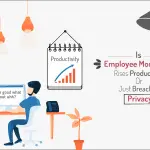In today’s digital age, employers often monitor employees. The goal is to boost productivity, ensure security, and keep to the rules. However, the ethical implications of monitoring employees have sparked significant debate. Is it ethical to monitor employee activities? The answer, as with many complex issues, lies in the approach.
Despite the negative opinion which people seem to have against monitoring of employees, it does have some value attached to it. Most of the time, phone calls, actions through endpoint or video and location tracking are the type which take place.
The reasons behind which monitoring occurs at companies includes performance, which is usually the primary objective. Security to check for any breaches in security and discovery and curiosity to be able to find newer ways through which productivity can be achieved.
The Ethical Stance to Monitor Employee Activities
When employees are being monitored in the workplace, transparency needs to be provided so that coherence and consistency are both maintained as part of the company. With newer forms of technology now being accessible to individuals, monitoring of employees also becomes crucial with companies having the objectives of maintaining security within the company.
Transparency Builds Trust
Implementing transparent monitoring practices is essential for maintaining trust and understanding among employees. Businesses should clearly say why they monitor and what they collect. Then, employees are more likely to feel respected and informed. Transparency helps to make the monitoring process less mysterious. It fosters openness and honesty.
Enhancing Productivity and Security
Ethical monitoring is key. It helps find and fix security risks, compliance issues, and inefficiencies. Businesses can find a balance by focusing on work, protecting privacy with clear policies. They balance oversight and individual rights. Using monitoring data to improve work processes and help employees. It can lead to higher productivity and job satisfaction.
Clear Boundaries and Ethical Guidelines
Setting clear boundaries and ethical rules for using monitoring systems is vital. It prevents abuse. Monitoring should never be used to micromanage. It should not invade privacy or create distrust. Instead, it should be seen as a tool for support and improvement, with a focus on outcomes rather than constant surveillance.
Counterarguments and Considerations
Despite the potential benefits, there are counterarguments to consider:
- Some argue that any monitoring infringes on privacy. It makes employees feel constantly watched.
- People might misuse monitoring data. They might use it for discrimination or wrongful firing. This shows the need for strict ethical guidelines and oversight.
- Over-reliance on monitoring can stifle creativity. It can also hurt innovation, as employees may feel hesitant to take risks or think innovatively.
- Monitoring can create a culture of fear and distrust, even with clear guidelines. This culture can harm team dynamics and morale.
Case Studies of Ethical Employee Monitoring Practices
Buffer’s “Default to Transparency” Policy
Buffer, a social media management company, is known for its open and transparent approach to employee monitoring. The company uses performance metrics and goal-setting to monitor. They focus on outcomes, not time spent working. This approach helps build trust and ensures that monitoring is seen as a tool for improvement rather than control.
Cisco Systems’ “Trust Inside” Program
Cisco’s “Trust Inside” program emphasizes transparency, consent, and the protection of employee data. The program includes regular audits to ensure compliance with privacy standards and the ethical use of data. Cisco prioritizes employee trust and data protection. It sets a high ethical monitoring standard.
Best Buy’s Results-Only Work Environment (ROWE)
Best Buy’s ROWE initiative gives employees autonomy over when and where they work, focusing solely on results. By ending the need for constant monitoring, Best Buy has seen better productivity. Employees are also more satisfied. This approach shows that trust and flexibility work better. They lead to better outcomes than traditional monitoring.
Impact of Transparent Communication on Trust and Morale
Clear talk about monitoring policies can boost employee trust and morale. This boost can happen in several ways:
Openness and Honesty:
Fosters an environment where employees feel respected and informed. Understanding and Accountability build trust. They show that monitoring aims to improve work and safety, not micromanage.
Fairness and Consistency:
Encourages a sense of accountability and fairness among employees.
Feedback and Collaboration:
Employees can provide feedback and suggestions on monitoring. This creates a more collaborative and inclusive workplace.
Best Practices for Implementing Transparency
- Define a Clear Purpose: Clearly say why you are monitoring and what you are monitoring.
- Open Communication: Share monitoring policies openly with all employees. Do so directly and provide chances for discussion.
- Data Handling Process: Establish a clear process for handling monitoring data. Ensure its security and confidentiality.
- Regularly update monitoring policies: Do this in line with tech advances and changes in work.
Ethical Guidelines To Monitor Employee’s Activity
Organizations can balance employee monitoring and privacy. They can do this by having clear, transparent policies. These policies should say what is being monitored and why. Ethical guidelines should include:
- Limiting Monitoring: Focus on work-related activities and obtain employee consent.
- Regular Review: Regularly review the necessity and scope of monitoring.
- Legal Compliance: Ensure compliance with relevant legal standards and protect employees’ personal data.
- Transparent Communication: Explain the purpose and extent of monitoring during onboarding. Also, provide regular updates.
Involve employees in the discussion about monitoring. This creates a positive and trusting workplace.
Mitigating Risks of Excessive Monitoring
Too much monitoring creates mistrust. It also raises stress and lowers job satisfaction. To mitigate these risks, companies should:
- Use monitoring as a tool for support rather than punishment.
- Provide regular feedback. Recognize employee achievements. This will balance out the negative effects of monitoring.
Ensure monitoring is minimally invasive. Focus on outcomes, not constant surveillance.
Ensuring Ethical and Responsible Use of Monitoring Data
Companies can ensure ethical and responsible use of monitoring data by:
- Strict Data Governance: It involves establishing strict data governance policies. They limit access to authorized personnel only.
- Anonymizing data where possible. Use it only for the purposes told to employees.
- Conducting regular audits and compliance checks to prevent misuse.
- Training includes teaching those who handle the data about ethics. It also covers data protection laws.
Involving Employees in Monitoring Policy Development
Employees should help make and carry out monitoring policies. This is to make sure their views and worries are heard. This involvement can be facilitated through surveys, focus groups, and open forums. By including employees, companies can design fair and reasonable monitoring practices. This will improve acceptance and compliance.
Conclusion
Employee monitoring can be ethical if done transparently and with good intentions. But, it requires a delicate balance between business needs and employee rights.
Clear ethics and transparency, along with involving employees, can create a positive work culture. It’s one where monitoring supports improvement rather than control.
Organizations want to implement ethical monitoring. They must prioritize transparency, privacy, and employee well-being. By doing so, businesses can achieve a harmonious balance that benefits both the organization and its employees.






